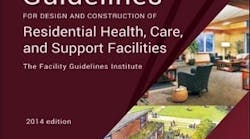The Facility Guidelines Institute (http://www.fgiguidelines.org/about.php), an organization dedicated to creating minimum design and construction guidelines for state licensing agencies, has completed its 4-year revision cycle, resulting in the new “Guidelines for Design and Construction of Residential Health, Care, and Support Facilities,” as well as its sister document, “Guidelines for Design and Construction of Hospitals and Outpatient Facilities.” Publication of both guides is set for March 2014.
These two documents utilized the 2010 version of the “Guidelines for Design and Construction of Healthcare Facilities” as the basis for revision. During the 2014 revision cycle, it was decided to separate long-term care design guidelines from the acute and ambulatory care guidelines, utilizing a consensus process with a multi-disciplinary committee, the Health Guidelines Revision Committee (HGRC).
A specialty sub-group (SSG) of over 40 volunteer industry experts were brought together as part of the 2014 cycle to update, improve, and create the new design guidelines for residential care communities. The ultimate goal is to provide the framework for environments that support positive resident and staff outcomes, and to support the national movement of integrating person-centered practices and the built environment.
Person-Centered Design: Breaking Down Regulatory Barriers
The evolution of communities that integrate person-centered values of choice, dignity, respect, self-determination, and purposeful living, resulting in the transformation of services, has significant implications for the design and construction of residential communities.
The transformation to a person-centered culture requires the creation of both long- and short-term living environments, as well as community-based settings where both residents and their caregivers are able to express choice and practice self-determination in meaningful ways at every level of daily life.
One of the unintended barriers to creating positive person-centered care models in long-term care settings is often outdated and obsolete regulations and licensing. This is one of the reasons for developing the new “Guidelines for Design and Construction of Residential Health, Care, and Support Facilities,” which provides minimum design requirements, as well as additional reference information for users. The goal is to provide a set of guidelines that will streamline the design portion of the licensing process for long-term care settings, help authorities tasked with evaluating design documentation, provide consistency between states, and improve resident care environments and outcomes.
Organization of the New Guidelines
Part 1 of the new “Guidelines” includes information on planning, programming, evaluation of risk, and considerations for the environment of care—all crucial to the success of a residential care community. Common elements, as well as an overlay for designing environments for residents with dementia, a sustainability section, and information on bariatrics is provided in Part 2, which is referenced from all of the specific facility sections.
Further, the “Guidelines” cover different categories and typologies for a variety of care models, providing an understanding and direction for the development of a wide range of senior living environments. The categories of care settings include:
- Nursing homes
- Hospice
- Assisted living facilities
- Independent living settings
- Adult daycare facilities
- Outpatient rehabilitation centers
- Wellness centers
Within each category, typologies have been utilized and designated by both the scale and the model of care in the environment being designed. For example, the nursing homes section includes information on three different models of care, each of which is supported by a different built environment: traditional, cluster/neighborhood, and household/small house. Each type includes basic descriptions, minimum requirements, and supportive reference information for each type of setting.
A Call to Action
It is the FGI’s desire to have providers and design professionals become familiar with and utilize the Guidelines, as this initiative requires designer and provider support to encourage adoption by states. Become an advocate to removing barriers to resident-centered environments by organizationally supporting the new Guidelines within your member associations and in meetings with state regulators! For further information, go to www.fgiguidelines.org or contact Jane Rohde at [email protected].
The text of the new FGI Guidelines for Design and Construction of Residential Health, Care, and Support Facilities was prepared under the leadership and direction of Jane Rohde, Tri-chair of the Specialty Subgroup (SSG) on Residential Care Facilities, a multidisciplinary subcommittee of the 2014 HGRC. The work of the SSG on Residential Care Facilities was made possible by the continuing advocacy and support of The Hulda B. & Maurice L. Rothschild Foundation and Robert N. Mayer, PhD, its President, and the Facility Guidelines Institute lead by Doug Erickson, CEO of FGI and chairman of the HGRC.
Jane Rohde is the founding Principal of JSR Associates, Inc. located in Ellicott City, Md. She champions a global cultural shift toward de-institutionalizing senior living and healthcare facilities through person-centered principles, research and advocacy, and design of the built environment. Her clientele includes nonprofit and for-profit developers, government agencies, senior living and health care providers, and design firms. Rohde speaks internationally on senior living, aging, healthcare, evidence-based design and sustainability.



